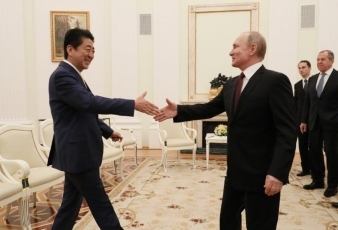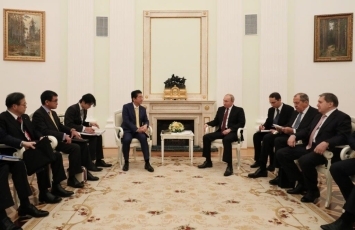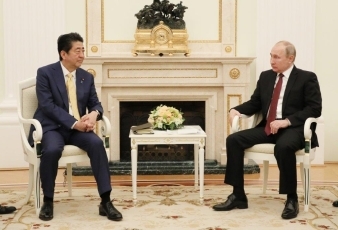Japan-Russia Relations
Japan-Russia Summit Meeting
January 22, 2019
 Japan-Russia Summit Meeting
Japan-Russia Summit Meeting(Photo: Cabinet Public Relations Office)
 Japan-Russia Summit Meeting
Japan-Russia Summit Meeting(Photo: Cabinet Public Relations Office)
 Japan-Russia Summit Meeting
Japan-Russia Summit Meeting(Photo: Cabinet Public Relations Office)
On January 22, Mr. Shinzo Abe, Prime Minister of Japan, held his 25th Japan-Russia Summit Meeting with H.E. Mr. Vladimir Vladimirovich Putin, President of the Russian Federation, (a one-on-one meeting for approximately 50 minutes, a small group meeting for approximately one hour, and an expanded meeting and working dinner for approximately one hour and 10 minutes).
1. Issue of concluding a peace treaty
- Issue of concluding a peace treaty: The two leaders held a candid and open exchange of views. They listened to reports from both foreign ministers, who held the first round of negotiations last week. The two leaders welcomed that concrete negotiations based on the agreement in Singapore have begun, and that there was an earnest and frank discussion. On that basis, the leaders instructed to advance the negotiations further by carrying out the next round of negotiations between the foreign ministers on the occasion of the Munich Security Conference (MSC), for example, and also between Special Representatives.
- The joint economic activities on the Four Northern Islands: The two leaders shared the view that they will instruct working-level staff to advance joint projects steadily and swiftly in order to realize the joint economic activities quickly.
- Humanitarian measures for the former island residents: Both leaders shared the view that a grave visits by airplane will be implemented as early as this summer.
2. Bilateral cooperation in a broad range of fields
- Defense exchanges and security: The two leaders shared the view that along with moving ahead with exchanges between defense authorities and border authorities, they will further broaden the scope of cooperation in areas that address “non-traditional threats,” including narcotics.
- Inter-parliamentary exchanges: The two leaders welcomed that inter-parliamentary exchanges are actively taking place, and shared the view that they will encourage those exchanges.
- Japan-Russia economic relationship: The two leaders welcomed progress with cooperation in the field of the economy, including the further realization of the Eight-point Cooperation Plan such as participation in operation of Khabarovsk Novy Airport and cooperation related to Samurai bond issuances by Gazprom. They also shared the view that they will accelerate this affirmative trend.
(Reference) Since the Summit Meeting held in September last year, approximately 30 private-sector documents have been signed. Currently, there are more than 170 private-sector projects, and around half of those projects have been implemented in the form of agreements and so on. - People-to-people exchanges: The two leaders welcomed that a Japan-Russia Governors’ Meeting is scheduled to be held for the first time in nine years in May this year. Prime Minister Abe announced a goal of doubling the number of mutual visitors by 2023 to at least 200,000 people respectively, and 400,000 people in total. They also shared the view that they will accelerate this positive trend.
- Political dialogue: The two leaders shared the view that a Japan-Russia Summit Meeting and a closing ceremony for the Japan-Russia exchange years will be held on the occasion of the G20 Osaka Summit in June.
3. International situations
- North Korea issue: The two leaders held a candid exchange of views on the denuclearization of the Korean peninsula, which is a common goal of Japan and Russia, and confirmed that they will coordinate closely.

